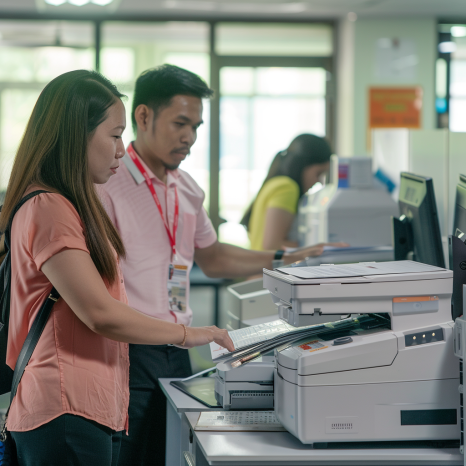Rental Contract Protection Tips

Introduction: Why Rental Contract Protection Matters
When renting equipment or office machines—especially high-value items like copiers and printers—businesses often focus on features and pricing. However, one of the most overlooked yet critical aspects of a rental agreement is contract protection. Without a well-understood and clearly written rental contract, your business could be exposed to unexpected fees, service lapses, or even legal disputes.
This comprehensive guide will walk you through the top Rental Contract Protection Tips to safeguard your business interests, avoid pitfalls, and ensure long-term value from your rental agreements.
1. Read the Entire Contract—Line by Line
This may sound obvious, but many companies fall into the trap of skimming rental agreements. Contracts are legally binding, and every clause—from maintenance coverage to renewal policies—matters.
Pro Tip: Always ask for a copy of the agreement before signing. If possible, have a legal advisor review it.
Also, check out this guide on contract terms for short-term rentals to understand the common clauses businesses encounter.
2. Clarify Maintenance and Support Coverage
One key clause that should never be vague is the maintenance agreement. Does the rental include preventive maintenance? How fast is their response time when breakdowns happen?
You should have clear answers to questions like:
Who handles repair costs?
Is there a guaranteed turnaround time for fixing issues?
Does the provider offer a replacement unit if repairs take too long?
Refer to this article on trends in printer maintenance and support to ensure you’re aligned with current service standards.
3. Define the Payment Terms and Total Costs
A major part of protecting your rental contract is understanding all costs upfront. This includes:
Monthly rental fees
Charges for over-usage (e.g., exceeding print quotas)
Security deposits
Late payment penalties
Don’t forget to ask about potential hidden charges, such as:
Delivery and installation fees
Early termination penalties
Consumables not included (e.g., toner or ink)
To avoid surprise fees, read this helpful cost analysis of short-term copier rentals.
4. Watch Out for Auto-Renewal Clauses
Auto-renewal clauses can lock your business into another rental term without notice. While this feature can be convenient, it can also be a trap if you don’t mark your calendar.
Make sure the contract includes:
Notification requirements before renewal
The length of the renewal term
Options for opting out
Some businesses get caught off guard and end up paying for equipment they no longer need. Knowing when and how to cancel your contract is a crucial Rental Contract Protection Tip.
5. Ensure Flexibility for Growth or Downsizing
Your office needs may change—especially for startups or growing businesses. A good rental contract should include flexible provisions such as:
The ability to upgrade or downgrade equipment
Add-on service options
Exit clauses in case of business closure
If your provider can’t offer flexibility, it might not be the right fit for long-term value. For example, short-term rentals often provide the flexibility that startups and seasonal businesses need.
6. Request an Equipment Condition Report
Before any machine is delivered, ask for a written condition report or checklist. This includes:
Physical inspection (scratches, dents, screen damage)
Test results (copy/print/scan quality)
Meter readings for usage tracking
This protects you from being blamed for pre-existing damage or inflated wear-and-tear charges at the end of the term.
7. Secure Insurance Provisions
Make sure to clarify who is responsible in the event of:
Accidental damage
Theft
Fire or water exposure
Some rental companies require equipment insurance, while others offer built-in coverage. Understand who carries liability—this should be clearly stated in the contract.
For more guidance, visit this article on copier rental insurance questions.
8. Know Your Exit Options
Things don’t always go as planned. You might need to return the equipment early or switch providers. That’s why it’s critical to:
Understand early termination clauses
Ask about buy-out options
Avoid contracts with harsh cancellation fees
Ensure that termination terms are fair and realistic for your business situation.
9. Document Everything in Writing
Verbal promises don’t count in contract enforcement. If a sales rep makes an offer—whether it’s a discount, waived fees, or extended support—request it in writing and have it attached to your contract.
Documentation is your best shield if disputes arise. Keep email trails, receipts, and copies of signed documents in one secure place.
10. Vet the Rental Company’s Reputation
Even the best-written contract can be problematic if the provider doesn’t uphold their end. Before committing, do your research:
Look for online reviews and testimonials
Ask for references from other clients
Check how long the company has been in the industry
A company with a good track record will likely honor their agreements and be more responsive in case of issues.
Conclusion: Protecting Your Business Starts with the Right Contract
Entering into a rental agreement doesn't have to be risky—if you know what to look for. From reading every line of the contract to securing flexible exit options, these Rental Contract Protection Tips will help you protect your investment, avoid disputes, and ensure a smooth rental experience.
Whether you're renting a copier, printer, or any other essential office equipment, always prioritize clarity, flexibility, and accountability. Your rental contract is not just a formality—it's your protection.
For more tips and personalized assistance, reach out to Marga Enterprises, a trusted name in copier and printer rentals in the Philippines.
Facebook Page: facebook.com/margaenterprises
YouTube Channel: youtube.com/@margaenterprises
Website: https://marga.biz
Contact Numbers: Globe: 0917-157-69817 | Landline: (02) 8256 2970
Let Marga Enterprises help you rent with confidence.
